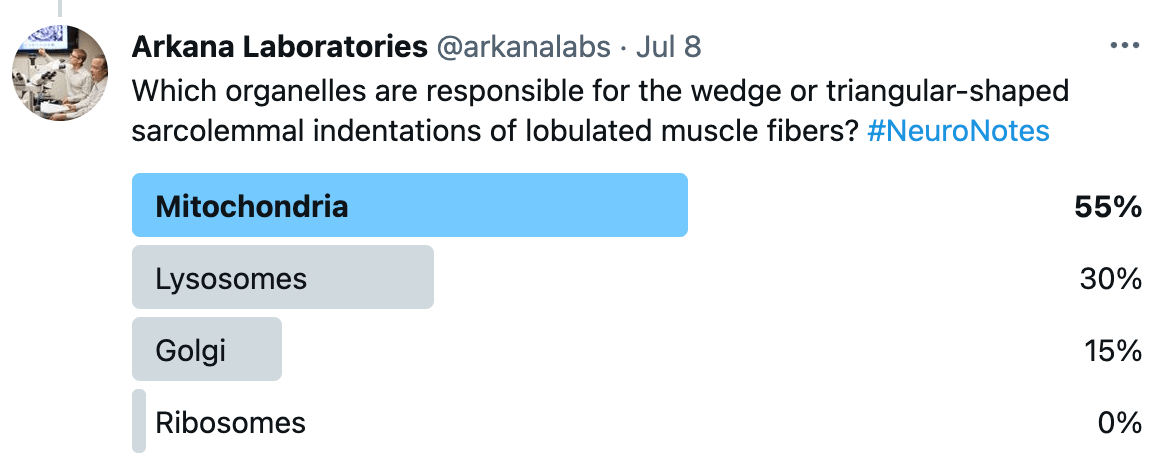
Figure 1 and 2: Lobulated Muscle Fibers with Wedge-shaped Accumulations of Mitochondria. Frozen sections of skeletal muscle stained with NADH-TR preparation (A) show a few scatted type 1 lobulated muscle fibers (black arrows) with coarse internal architecture staining with intensely dark staining wedge-shaped or triangular-shaped accumulations along the periphery of the muscle fiber. A few targetoid muscle fibers are also seen. Ultrastructural examination confirms that these small accumulations are composed of mitochondria with one such aggregate demonstrated (black arrow). Original magnifications: A. Frozen Section NADH-TR, 100x; B. Electron microscopy, 1500x.
Considering the clinical vignette from the prior week: An elderly male patient presents with chief complaint of “dull achy pain” predominantly in his thighs and hip girdle region. Muscle enzymes showed CPK 934. Other past medical history includes diabetes mellitus, hyperlipidemia, hypertension, hypercalcemia, and vitamin D deficiency. Due to clinical concern for a possible acquired inflammatory myopathy, such as polymyositis, the decision was made to biopsy the left thigh. The muscle biopsy shows lobulated muscle fibers, see Figure 1. Which organelles are responsible for the wedge or triangular-shaped sarcolemmal indentations of lobulated muscle fibers?
The muscle biopsy shows lobulated muscle fibers, see Figure 1. Which organelles are responsible for the wedge or triangular-shaped sarcolemmal indentations of lobulated muscle fibers?

Answer: Mitochondria
Lobulated muscle fibers (or trabeculated muscle fibers) are usually type 1 muscle fibers demonstrating irregular sarcoplasmic architectural disarray with predominantly subsarcoplasmic wedge-shaped or triangular-shaped accumulations of mitochondria, answer choice (A) is correct.
These mitochondrial accumulations are thought to be due to a defect with normal mitochondrial anchoring near Z-bands. See references.
Why were the other answers wrong?
Accumulations of lysosomes, answer choice (B), may be seen in a variety of metabolic myopathies, ranging from glycogen storages diseases to autophagic vacuolar myopathies. Lysosomes do not yield the characteristic morphology of lobulated muscle fibers.
The other answer choices are normal organelles, the Golgi apparatus and ribosomes, choices (C) and (D), respectively. These structures may be seen upon routine electron microscopy, and the ability to recognize these normal structures is key to avoiding a diagnostic pitfall. Golgi may be seen near myocyte nuclei. Recognizing small dark ribosomes is key to appreciating the rough endoplasmic reticulum, and may also be seen near myocyte nuclei.
References
Burns DK, et al. Skeletal Muscle Biopsy Evaluation. A Case-Based Guide to Neuromuscular Pathology, 2020: 3-48.
Figarella-Branger D, El-Dassouki M, Saenz A, et al. Myopathy with lobulated muscle fibers: evidence for heterogeneous etiology and clinical presentation. Neuromuscul Disord. 2002 Jan;12(1):4-12. PMID: 11731278.
Guerard MJ, Sewry CA, Dubowitz V. Lobulated fibers in neuromuscular diseases. J Neurol Sci. 1985 Jul;69(3):345-56. PMID: 3162002.
Liewluck T, Milone M, Mauermann ML, et al. A novel VCP mutation underlies scapuloperoneal muscular dystrophy and dropped head syndrome featuring lobulated fibers. Muscle Nerve. 2014 Aug;50(2):295-9. PMID: 24838343.
Tsuburaya R, et al. Lobulated fibers in a patient with 46-year history of limb-girdle muscle weakness. Neuropathology. 2011;31:455-7.
Weller B, Carpenter S, Lochmüller H, Karpati G. Myopathy with trabecular muscle fibers. Neuromuscul Disord. 1999 Jun;9(4):208-14. PMID: 10399746.
Quick note: This post is to be used for informational purposes only and does not constitute medical or health advice. Each person should consult their own doctor with respect to matters referenced. Arkana Laboratories assumes no liability for actions taken in reliance upon the information contained herein.


